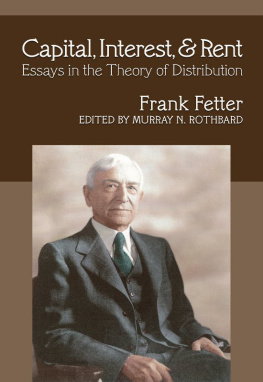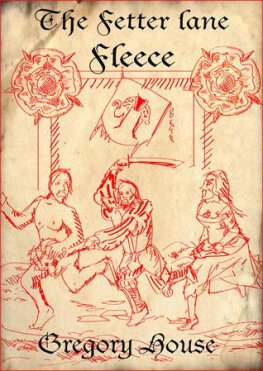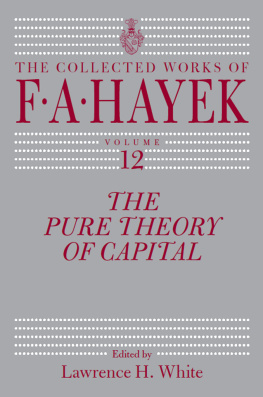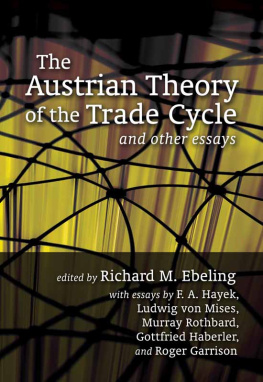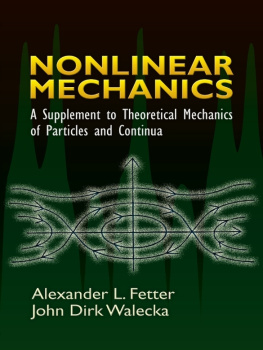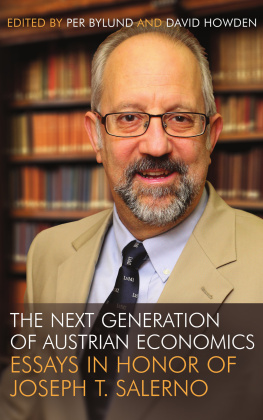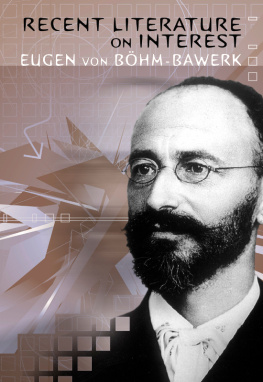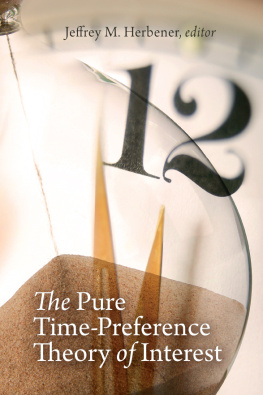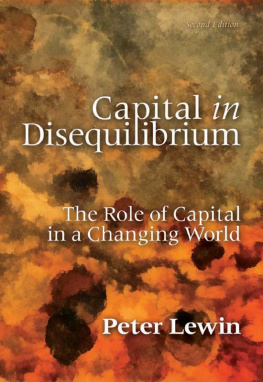Capital, Interest, and Rent
Studies in Economic Theory
Laurence S. Moss, Editor
Americas Great Depression, Murray N. Rothbard (1975)
The Economic Point of View, Israel M. Kirzner (1976)
The Economics of Ludwig von Mises: Toward a Critical Reappraisal, ed. Laurence S. Moss (1976)
The Foundations of Modern Austrian Economics, ed. Edwin G. Dolan (1976)
Capital, Interest,
and Rent
Essays in the Theory of Distribution
By Frank A. Fetter
Edited with an Introduction by
Murray N. Rothbard
SHEED ANDREWS AND McMEEL, INC.
Subsidiary of Universal Press Syndicate
Kansas City

This edition is cosponsored by the Institute for Humane Studies, Inc., Menlo Park, California.
Capital, Interest, and Rent
Copyright 1977 by the Institute for Humane Studies. All rights reserved. Printed in the United States of America. No part of this book may be used or reproduced in any manner whatsoever without written permission except in the case of reprints in the context of reviews. For information write Sheed Andrews and McMeel, Inc., 6700 Squibb Road, Mission, Kansas 66202.
Library of Congress Cataloging in Publication Data
Fetter, Frank Albert, 1863-1949.
Capital, interest, and rent.
(Studies in economic theory)
Bibliography of Frank Albert Fetter: p.
Includes bibliographical references and index.
1. Distribution (Economic theory)Addresses,
essays, lectures. I. Title. II. Series.
HB771.F47 1976 330.1 76-25587
ISBN 0-8362-0684-3
ISBN 0-8362-0685-1 pbk.
PREFACE
I was first apprised of Frank A. Fetters contributions to the theory of distribution by the references in Ludwig von Misess Human Action (1st ed., New Haven: Yale University Press, 1949; 3d ed., Chicago: Henry Regnery, 1966). Then, while reading Fetters oeuvre in the course of writing my Man, Economy, and State (2 vols., Princeton, N.J.: D. Van Nostrand, 1962, reprinted., Los Angeles: Nash Publishing Co., 1970), I was struck by the brilliance and consistency of his integrated theory of distribution and by the neglect of Fetter in current histories of economic thought, even by those that are Austrian oriented. For Fetters systematic theory, while challenging and original (particularly his theories of interest and rent), was emphatically in the Austrian school tradition.
The present volume includes all of the essays in which Fetter developed and presented his theory of distribution; the only important writings excluded are his two treatises: The Principles of Economics (New York: The Century Co., 1910) and Economic Principles (New York: The Century Co., 1915).
I am indebted to Professor Emeritus Joseph Dorfman of Columbia University for examining my introduction and the collection of essays with his usual thoroughness and for making many valuable suggestions. The editor of this series, Professor Laurence S. Moss of the University of Virginia, also made many helpful suggestions. Neither is responsible for any errors that may remain.
I would like to thank the American Accounting Association, publishers of the Accounting Review; the editors of the Quarterly fournal of Economics; the Academy of Political Science, publishers of the Political Science Quarterly; the University of Chicago Press, publishers of the Journal of Political Economy; and Macmillan Publishing Company for permission to reprint the articles in this volume.
Murray N. Rothbard
New York, N.Y.
March, 1976
CONTENTS
Murray N. Rothbard
5. Review of Bhm-Bawerk, Einige strittige Fragen
der Capitalstheorie (1902)
6. Review of Bhm-Bawerk, Positive Theorie
des Capitals (1902)
11. Reformulation of the Concepts of Capital and
Income in Economics and Accounting (1937)
3. Review of Gustav Cassel, The Nature and Necessity
of Interest, and Bhm-Bawerk, Recent Literature on
Interest (1905)
2. Landed Property as an Economic Concept and
as a Field for Research Discussion (1917)
Introduction
Frank Albert Fetter (1863-1949) was the leader in the United States of the early Austrian school of economics. Born in rural Indiana, Fetter was graduated from the University of Indiana in 1891. After earning a masters degree at Cornell University, Fetter pursued his studies abroad and received a doctorate in economics in 1894 from the University of Halle in Germany. Fetter then taught successively at Cornell, Indiana, and Stanford universities. He returned to Cornell as professor of political economy and finance (1901-1911) and terminated his academic career at Princeton University (1911-31), where he also served as chairman of the department of economics.
Fetter is largely remembered for his views on business monopoly (see his Masquerade of Monopoly [ New York: Harcourt, Brace and Co., 1931]). But long before he published his work on monopoly in the 1930s, he developed a unified and consistent theory of distribution that explained the relationship among capital, interest, and rent. While Fetters theoretical work, like much of capital and interest theory in recent decades, has been generally neglected, much of it is still valuable and instructive today. In my opinion, microeconomic analysis has a considerable way to go to catch up to the insight that we find in Fetters writings in the first decade and a half of this century.
Apart from his two lucidly written treatises (The Principles of Economics [New York: The Century Co., 1904]; and Economic Principles [New York: The Century Co., 1915]), Fetters major contributions to distribution theory appeared in the series of journal articles and shorter papers that I have collected to form this volume. It was difficult for me to classify Fetters work into the categories of capital, rent, and interest, because his was an unusually systematic and integrated theory of distribution, all areas of analysis being interrelated.
Fetters point of departure was the Austrian insights that (1) prices of consumer goods are determined by their relative marginal utility to consumers; and (2) that factor prices are determined by their marginal productivity in producing these consumer goods. In other words, the market system imputes consumer goods prices (determined by marginal utility) to the factors of production in accordance with their marginal productivities.
While the early Austrian and neoclassical schools of economics adopted these insights to explain prices of consumer goods and wages of labor, they still left a great many lacunae in the theories of capital, interest, and rent. Rent theory was in a particularly inchoate state, with rent being defined either in the old-fashioned sense of income per year accruing to land, or in the wider neo-Ricardian sense of differential income between more and less productive factors. In the latter case, rent theory was an appendage to distribution theory. If one worker earns $10 an hour and another, in the same occupation, earns $6, and we say that the first mans income contains a differential rent of $4, rent becomes a mere gloss upon income determined by principles completely different from those used to determine the rent itself.
Frank Fetters imaginative contribution to rent theory was to seize upon the businessmans commonsense definition of rent as the price per unit service of any factor, that is, as the price of renting out that factor per unit time. But if rent is simply the payment for renting out, every unit of a factor of production earns a rent, and there can be no no-rent margin. Whatever any piece of land earns per year or per month is rent; whatever a capital good earns per unit time is

